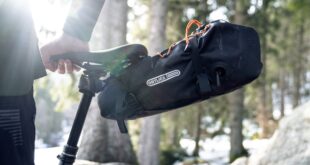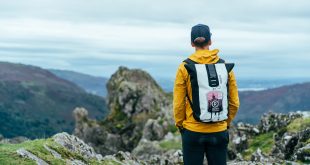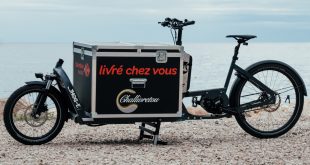Ortlieb, the German manufacturer of biking accessories, has introduced two new products and a new colourways to its range.
The new products include a dark sand colourway added to the bikepacking collection, the Duffle RC, and the Back-Roller Plus – a big brother to the original.
As part of the launch, the business has also published the product carbon footprint of its entire, almost 400 item, product range.
Duffle RC – versatility, lower price, no zipper
Duffle RC blends durability and functionality. With a roll closure for no-nonsense access and IP64 protection, this sustainably produced German-made bag has been optimised for challenging conditions.
Optional Cargo Straps can secure the bag through its daisy chains, and padded, removable shoulder straps transform it into a backpack for added convenience.

New bikepacking colour – dark sand
The Ortlieb bikepacking collection is now available in an all-new dark sand colour. Using the same PVC-free, waterproof nylon, the new, more-earthy colour is available now on all of the bags in the bikepacking collection.
Back-Roller Plus
Crafted from lightweight, waterproof Cordura fabric, the Ortlieb Back-Roller Plus improves on the world’s first RF-welded bike pannier, the Back-Roller, with a 20-litre main compartment and the Quick-Lock 2.1 attachment system ensuring easy attachment.
New features such as the external accessory pocket and shoulder strap are designed to enhance comfort, making it the choice for commuters and tourers, alike.
Product carbon footprint explored
Ortlieb production is based in the Bavarian town of Heilsbronn, with the brand sourcing more than 70% of its materials in Germany.
Taking the next sustainability step, the business has determined and published what is known as the product carbon footprint for all of its nearly 400 products.
A product’s footprint indicates the emissions that are generated from sourcing of the raw materials, transport, in-house manufacturing, and on to the delivery of the finished product.
On the Ortlieb website, customers can now see how many kilometres they would need to travel by bike, rather than car, in order to compensate for the manufacturing of a particular bag.
All CO2e values (CO2 equivalent) of every product are even integrated within the company’s Enterprise Resource Planning (ERP) system.
This enables the current footprint to be recalculated in real time so that progress in the reduction of emissions for the product can be displayed on the website.
 BikeBiz Bicycle and cycling retail news
BikeBiz Bicycle and cycling retail news




